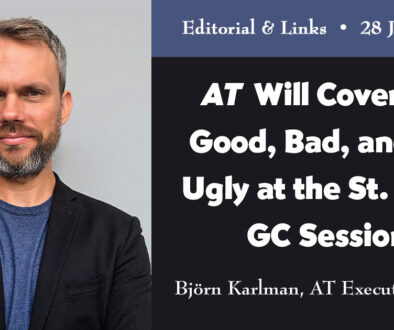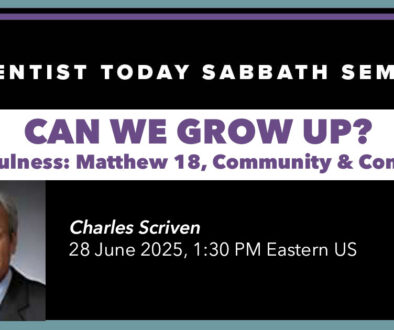ATSS: Lindsey Abston Painter, “Neurodivergent People in Church”
27 November 2024 |
What do you imagine when you think of a winsome and attractive church? You probably imagine a church where people are well-dressed and classy, every child is well-behaved and every adult thoughtful and attentive.
Yet the real church isn’t like that. You have likely met some very unusual people in church. People with odd personalities. Strange fixations. Troubled families. Someone who talks to herself, or is focused on conspiracies. Children who others think are “out of control.”
The church of perfect people doesn’t exist. How can we be God’s church when so many of us are so broken in so many ways?
We call brains that are different from what society considers typical “neurodivergent.” That includes attention-deficit/hyperactivity disorder, autism, obsessive-compulsive disorder, borderline personality disorder, bipolar disease, and other mental illness or personality disorders—and even unusual giftedness. Those whose mental health is at a bad stage can be disruptive. Others might just seem weird—the kind of person you don’t want to get too close to.
Such people exist in many congregations. The church, and the things we do as a church, are designed for people in the middle of the “normal” bell curve. But what of the neurodivergent people? God loves them just as much. Wouldn’t it make sense that they might have different ways of approaching God in worship, prayer, study, socializing, and behavior?
I’ve always felt out of step with people around me. While I’m mysteriously good at some things without having to try very hard at all, I’m also mysteriously bad at things that others seem able to do without—apparently—even thinking about it.
My neurodivergence isn’t as noticeable as some, but it has made it hard for me to do certain things. I have ADHD—Attention-Deficit/Hyperactivity Disorder. My brain is wired differently. Those with ADHD are frequently creative and artistic—funny, life-of-the-party types, spontaneous and joyful, and out-of-the-box thinkers. But we can also be oversensitive—so sensitive to the pain in the world around us that it hurts us. We act impulsively, have memory problems, are disorganized, and constantly lose things. We can have problems regulating our attention span—either too short, or overattentive and hyper fixated. (When I was a young adult I would often become so absorbed in a book that I would forget to eat, reading for 6-8 hours at a time.)
In this class we’re going to look at the neurodivergent people in our spiritual community, and ask what we can do to help them to exercise faith in ways that are meaningful to them, and how we can help them fit in with the rest of us.
Teacher:
Lindsey Abston Painter is an associate editor of Adventist Today.
Moderator:
Loren Seibold is the Executive Editor of Adventist Today.
How to join:
Join Zoom Meeting: https://us06web.zoom.us/j/87363048719
Passcode: ADVENTIST (ALL CAPS)
ATSS starting time depends on where you are. If you’re on the west coast of the United States, it’ll be 10:30 AM. On the east coast, 1:30 PM. Times in Europe, Africa, and elsewhere will vary with local time changes. Please double-check the correct time where you live.
The class is intended to last about 2 hours, though the conversation often continues to 4 PM (Eastern time).
About our class:
- The AT Sabbath Seminar is intended to be a courteous forum.
- Stick to the topic in both comments and chat discussion.
- Make your comments and questions short—don’t dominate.
- Keep your microphones muted unless you are called upon to make your comment or ask your question.
- Indicate your interest in speaking by raising your electronic hand.
- Please use your name when you sign in, so we know who we’re addressing.
We look forward to getting acquainted with you!
YouTube channel:
You can see all of our previous ATSS recordings here.
Coming up:
- Lena Toews
- Warren Trenchard
- Denis Fortin
- Mark Carr




